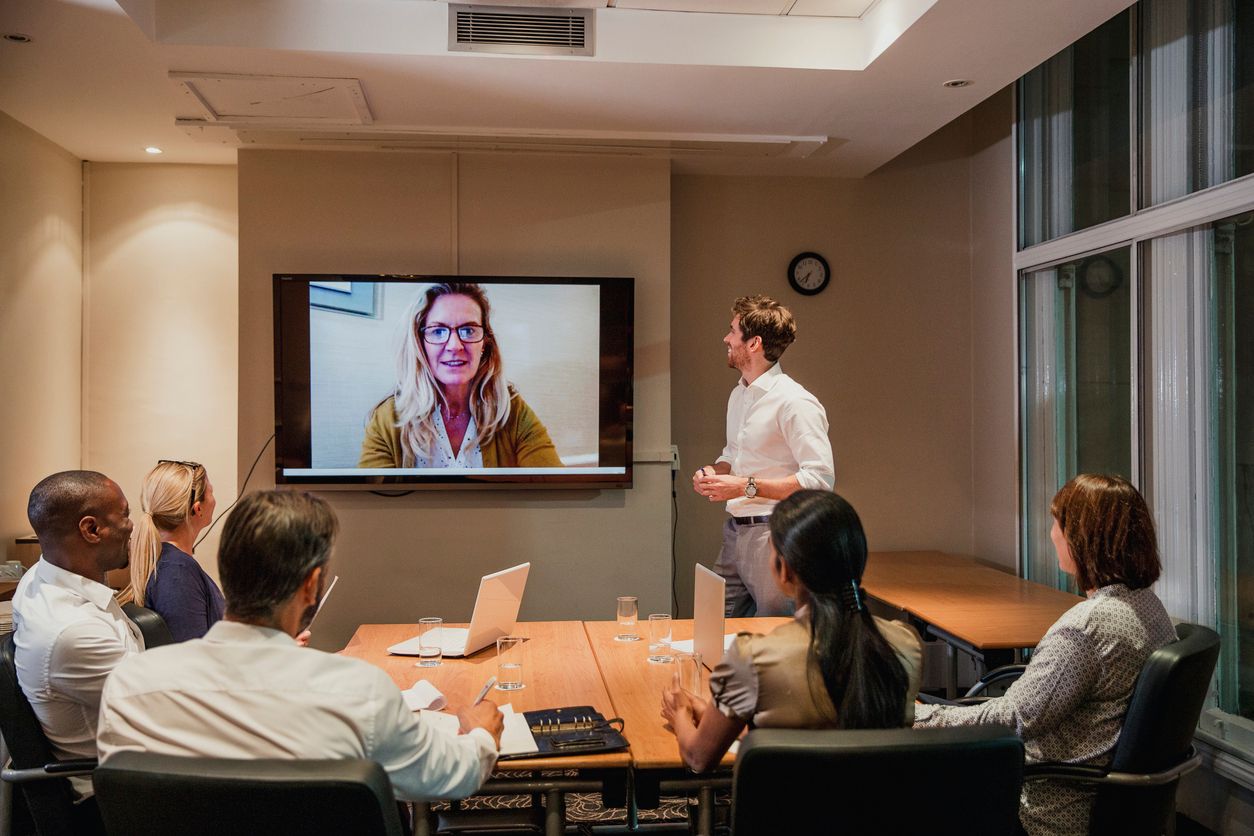When it comes to recruiting, the interview is the main event. The pièce de résistance, if you will. All the time you spent writing your job ad and screening the applicants have all led up to this point.
This is the moment when your company decides who is going to get a job offer, and when the candidate decides if they would say yes or not.
But conducting a perfect interview isn't as simple as it seems.
You want to get the most of the candidate but you don't want to coach answers out of them.
You want to put them at ease but you always want to see how they react under high-pressure situations.
It can be tough to find the right balance, but with proper preparation and solid planning, you’ll be conducting top tier interviews in no time.
This guide will help you understand everything you need to know about conducting an effective and efficient interview, from the pre-interview planning to the post-interview debrief.
Here’s what we’ll cover:
- How to prepare for the interview
- Why you should conduct preliminary phone interviews
- Skills assessment and personality tests
- How to conduct the main interview
- Interview questions do's and don’ts
- The post-interview debriefing period
- Overseeing follow ups and feedback
- Making your job offer

Preparing for the interview
In many ways, the pre-interview preparation is just as important as the interview process itself.
You want to make sure your candidates have a good interview experience and that you're not wasting unnecessary time with an inefficient and inconsistent hiring process.
Here is our guide for planning the perfect interview:
- Determine your process. For instance, this could be a phone interview, an assessment, and then a second on-site interview. It's important to outline these steps ahead of time so you can adequately plan how many resources and people you'll need to make this process as seamless as you can.
- Identify interviewers. It's a good idea to select people from a diverse range of backgrounds and identities to help interview applicants. Having multiple interviewers from different walks of life can help reduce any unconscious biases from influencing the interview process. Plus, having a few more hands on deck can make assessing and ranking your selected candidates much easier and more straightforward.
- Create some standardised interview guides. This could include a brief summary of points you want them to inform the candidate of, such as the company mission statement or role responsibilities. You could also provide the interviewers with a list of questions to stick to and an assessment guide. This way, your hiring team has a definitive set of metrics by which to fairly assess and rank your candidates.
Preliminary phone interviews
The humble telephone interview is a great way of streamlining the interview process.
After filtering through applicants, many employers are left with a huge stack of potential candidates to choose from.
A short and simple 15-20 minute preliminary phone interview is all it takes to identify the best candidates of the bunch and save everyone some time.
Just like any part of the recruiting process, preparation is key. Spend a few minutes looking through the CVs of your candidates and outline areas which you want to question further.
Next, create a list of basic but crucial questions lined up as well.
Some of our favourite phone interview questions are:
- 'What do you know about our business?'
- 'What interests you about this role?'
Both of these questions require a candidate to at least have done a little bit of digging prior to the call, letting you know off the bat whether or not they are prepared for this call and are eager about the job.
Finally, be ready to answer questions. The candidate is evaluating you as much as you are them, so be prepared to answer extensive questions about the role so that you may draw in genuinely interested and enthusiastic candidates.

Skills Assessment Tests
Having a skill assessment stage is becoming increasingly more popular amongst many companies. Not only are skills tests time-saving, but they can be tailored to individual job roles to assess essential skills required for a job.
Your skills test should include a minimum of six role-relevant questions, at least one of which is an immersive style question. This means it should require a candidate to actively create or edit a document or spreadsheet to prove their competency.
Plus, skills-based tests lead to more inclusive hiring, as they deprioritise factors, such as background, education, and former experience, which may otherwise put a candidate at a disadvantage in the interviewing process.
In fact, studies have even shown that companies with pre-employment skills testing have a much higher level of racial diversity than those which don't.
If you’re looking for some great skills assessment providers, here are our top picks:
Personality Tests
All candidates have unique personalities and character traits. Some of these may work perfectly within your business, but some may not. The good news is that employers can gauge whether their candidates are the right fit for the role or their company by using pre-employment personality tests.
→ FREE DOWNLOAD: ULTIMATE INTERVIEW GUIDE
Different traits can be more valuable than others depending on the role, and personality tests help assess this.
For instance, a salesperson needs to be goal-orientated so that they are motivated to work towards their targets whilst a software developer would benefit from being a problem solver in order to excel in their highly logical role.
Whatever it is you need from your candidate, using a personality assessment early on in the selection process can greatly improve the accuracy and reliability of your final hiring decision.
Here are some of our suggestions for the best personality test providers:

Pre-interview steps
Quick takeaways:
- Gather your hiring team in advance
- Scan the applicant’s CV once more
- Prepare your list of questions and assessment guides
So, you've outlined who will be conducting interviews and what kind of interview techniques and structure they'll be following. Now it's time to bring the best candidates in for the main interview. But before they arrives, here are some steps you should be taking:
- Gather your interview team five or ten minutes before your interview begins for some last minute strategy talk and double check on which questions will be asked and by whom.
- Scan over the candidate's resume to re-familiarise yourself with their experience and qualifications, and have your structured list of questions in place to help seamlessly guide the interview along.
- Delegate roles and questions to the different interviewers so that everybody has the opportunity to ask the candidate about their interest in the role. Not only does this ensure the interview will be seamless, but the candidate will feel less like they’re being questioned by one person and more like they are having a friendly conversation with everyone involved.

Conducting the interview
This is it. The main event. You’ve done all the necessary preparation to make this a seamless event so it’s time to jump straight in.
Whether you’re accustomed to interviewing job candidates or you’ve never done it before, it’s worth looking at the following steps to make sure everything stays on track and you make the most of the time you have with your interviewees:
- Introduce yourself - To help ease candidates’ nerves, open up the interview with some introductions and a bit of background information about the interviewers.
- Set the stage - Whether you’re in a local cafe, a meeting room, sitting on the office roof terrace, or on a Zoom call, make sure the interviewing location is tidy, easily accessible, and not full of distractions.
- Provide some preliminary information - Let the candidate know how long the interview will take, discuss your business and what you do, and spell out what this position is once more.
- Question with care - If the candidate has nervous body language or is avoiding eye contact, they may be nervous, so always start off with some light, general questions. Then, once they’ve settled, throw in some more complex ones and make sure they have plenty of time to explain their answers and show off their enthusiasm for the role.
- Keep small talk professional - Remember, the interview begins as soon as the interviewee arrives. This means even small talk is considered part of the interview. A lot of hiring managers are unaware of this and can potentially ask personal questions which are inappropriate to a professional interview, landing themselves in HR hot water.

Interview Questions
Quick takeaways:
- Focus on questions that assess soft skills
- Ask experience and skills related questions
- Ask situational questions
A good interviewer gets the information they need out of the candidates by asking the right questions. You want specific questions that can assess the interviewees' soft skills, such as their critical thinking skills or capacity to problem solve.
It’s important to ask a mixture of direct experience or skills related questions, such as 'have you ever worked with this software before?', as well as situational questions that assess a candidate's ability to adapt to hypothetical situations.
For instance, 'how would you approach a task you'd never done before?' or 'has there ever been a time when you weren't happy with the work you produced?'.
Open ended questions such as these will get the candidate talking about who they are and how they work, sometimes without them even realising it.
To help you out, we've compiled a brief list of top interview questions you should and shouldn't be asking to give you a better idea of how to make the most of.
Top questions to ask
1) What attracted you to this role?
This screener question is great for identifying which candidates have the most enthusiasm for the role and are willing to do a little bit of research to prepare for your interview. Judging by the candidate's answer, you'll know who read the full job description and who chose to have a look on your business' website.
2) When tackling a difficult task, what steps do you take to get the job done?
This question will give you valuable insight into a candidate's critical thinking and organisational skills. You want to know that you're picking someone who is able to approach a hefty task intentionally, logically, and efficiently, and not just someone who jumps into a job with no process in place.
3) What motivates you to work?
Whilst this seems like a fairly simple question, it does provoke the candidate to uncover some quite deep sentiments about what they are striving towards.
Perhaps they want a goal-defined role as this type of competitive approach helps them stay on track and hit deadlines. Or maybe, they find the concept of continuously learning on the job intriguing which would indicate that they want a role that they can advance in.
4) How do you define success?
Asking someone what their idea of success is tells you countless things about who they are as a person.
They might say money and power, which is fine. That is what success looks like to many people. But if your candidate says happiness, constant self-improvement, or something else which pertains to their own qualities as a human rather than a worker, that's even better.
5) What kind of goals do you want to achieve in the next five years?
The 'where do you see yourself in five years?' is a classic, we know. But we've put a little twist on it. Instead of focusing on what title or position a person will obtain in the near future, ask them if they have any personal and professional goals.
Nobody knows what their future holds, and plans can change at the drop of a hat. But seeing how a candidate plans to achieve their career goals gives you a lot of insight into how they think and work, and how they want to better themselves in the short-term.
Top questions to avoid
1) Why do you want to work for this company?
Most of the time that a candidate applies for a job, it's got absolutely nothing to do with the company itself. Generally, a candidate is interested in a role due to what the role consists of and how that specific role will benefit their career.
Chances are, most of your interviewees probably only heard of your company a week or so ago. Of course, they can read up on you later on in the application process and discover how great your business is. But your business probably won't be what initially attracted them to the role.
2) What is your greatest weakness?
This one is so overdone and, to be completely honest, kind of pointless. Every single candidate that walks into an interview has probably been asked this before, and will have their box-ticking answer locked and loaded for it.
Plus, absolutely nobody is going to be truly honest and tell you what their worst trait is to the person they want to hire them. Instead, candidates will give you a fake answer like 'I'm a perfectionist' or 'I'm a workaholic'. They won't tell you that they are always late for work or that they waste hours getting too involved in office gossip.
3) Do you have children?
Even if you're just trying to make small talk on your way into the interview room, this question is a huge no. Questions pertaining to personal living situations and family status are highly inappropriate and can be categorised as discriminatory.
For instance, female candidates being asked this might get ruled out if they answer that they are planning on becoming a mother in the near future. In addition, an LGBTQ+ candidate may not be comfortable answering such personal, family-related questions in the fear that revealing their gender identity or sexuality may affect or influence the final hiring decision.
4) If you could be any animal, what would it be?
Any variation of this kind of novelty question is usually one to avoid. Whilst it might be a fun ice-breaker, these kinds of weird, left-field interview questions don't add anything of value to the process and are certainly not going to reveal which candidate is best for the role.
Keep the tone professional yet light, and ask questions that won't throw your candidates off.
5) What's the worst manager you've ever had?
Perhaps you want to ask a candidate how they've handled former issues at work or how they would deal with a conflict if one should arise. But, anything which encourages a candidate to bad mouth previous workplaces or discuss professional conflicts that they might have had are generally a no-go.
You'll either end up getting a false answer from a candidate who doesn't want to talk about former conflicts, or you'll get the truth which you probably wont like. Best to avoid asking candidates about past negative experiences in the workplace and focus on their past accomplishments and interest in your company.

Post-interview debrief
Quick take-aways:
- Debrief straight away
- Use your standardised forms to assess the candidate
- Introduce an impartial outside perspective
The post-interview debrief is a vital part of the interviewing process which is often overlooked. Perhaps this is because most hiring managers make their decision on who will be the new hire during the interview itself. Regardless, the post-interview debrief is there to ensure that every candidate is judged fairly, and is not just being selected for their charming personality.
Conduct this debriefing straight after the interviews, whilst the candidate's answers are still fresh in your mind. If you've created standardised interview questionnaires or surveys, take this time to go through them and ensure all the information noted down is correct.
Formally assess the candidate against the metrics you set out so that they will be easier to rank after all the interviews are finished.
Bring in new eyes and ears to make your hiring decisions as unbiased as possible? As we mentioned, hiring managers can often jump the gun with a candidate who they really got along with, so bring in an outsider who is able to see the candidate profile from an impartial perspective.
Feedback and follow ups
Quick takeaways:
- Follow up the interview with a thank you to each candidate
- Give unsuccessful candidates as much feedback as possible
- Ask for feedback about your hiring process
The interview may be now completed but there is still a lot of important work to be done!
Send out a follow up email immediately after the interview, thanking all the candidates for their time.
If you've got other interviews to complete, giving an estimated date for proper feedback or next steps is vital to keep your candidates engaged.
Once your decision is made, you have both the exciting job of offering the top candidate a new role, and the less exciting job of letting down the remaining candidates.
Give unsuccessful candidates as much constructive feedback as possible. Tell them where their strengths were and what their weak points were. Being rejected for a role is tough, but if you give them something they can work with in future interviews, it will end up being a more positive experience for them.
Remember to ask for feedback from the candidate in regard to your company's whole application process. Currently, only around 25% of companies ask candidates to fill out some kind of feedback form.
Not only will this show that your business genuinely cares about candidate experience, but any feedback will help you optimise your hiring process.

Making an offer
Quick takeaways:
- Informally offer the job over the phone first
- Finalise the details and send out an official letter
- Run some pre-employment checks
- Don’t forget to get in touch with references
This is it. You started with a whole bunch of job candidates and now you've finally narrowed it down.
Phone the successful candidate first before you write your official job offer letter. Not only is it lovely to hear a candidate's excitement and surprise when you offer them a job, but this call is also a great opportunity for ironing out those final details before you finalise them in an offer letter.
Run pre-employment checks. These aren't always necessary and they don't have to happen this late on in the game, when or if you choose to do your checks is completely up to you.
Checking your potential new hire's references is a step that should never be skipped. Reference checks will tell you more about a candidate than they will ever be willing to tell you.
A whopping 69% of employers stated that they changed their mind about a candidate after speaking with a reference. So, don't wait for any nasty surprises and hear straight from the horse's mouth what kind of employee your new hire is.
→ FREE DOWNLOAD: ULTIMATE INTERVIEW GUIDE
Finding top talent can come with many challenges, but don't let your interview techniques be the reason you wind up without a candidate for the role. With proper planning and preparation, you'll be able to conduct effective interviews to make better hires and save your company the time and effort of bad recruiting.



![How to Hire a Remote Software Developer [ Step-by-Step Guide ]](/content/images/2022/04/iStock-1163541557.jpg)
![9 Zoom Interview Questions to Ask Software Engineers [ Recruiter´s Guide ]](/content/images/2022/04/iStock-1319790212.jpg)
![What is the Average Software Developer Salary? [ For Startups ]](/content/images/2022/03/iStock-1017296544.jpg)
